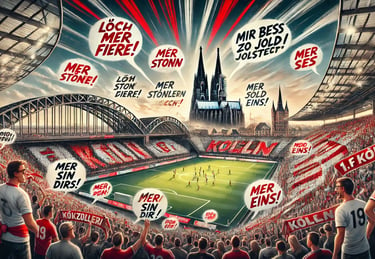Official fan club of 1. FC Cologne in Brazil
Kölscher Dialect


The Kölsch dialect...
More than just a dialect, a way of life.
The Cologne dialect, also known as Kölsch, is more than just a local vernacular – it is an expression of Rhenish joie de vivre and deeply rooted in Cologne's culture. Kölsch belongs to the Ripuarian language group, a dialect branch of Middle Franconian that extends across the Rhineland to Belgium and the Netherlands.
The roots of the Cologne dialect date back to the Middle Ages. Even then, a distinct language with Frankish influences developed from Latin, which was influenced by Roman settlement. Over the centuries, Kölsch was further shaped by Dutch, French, and later High German influences. The French influence was particularly strong during the Napoleonic occupation in the 19th century – hence many Kölsch terms such as 'Trottoir' (sidewalk) or 'Fisimatenten' (excuses).
Kölsch is characterized by a soft, melodic pronunciation. Typical are the use of 'isch' instead of 'ich' and the frequent diminutives of words ('Klüngel', 'Bützje'). Kölsch also has a special grammar: the pronoun 'et' often replaces the indefinite 'es' ('Et es wie et es' – 'It is as it is').
Kölsch is also known for its humorous and down-to-earth sayings, including the famous 'Cologne Basic Laws', which reflect the Rhenish attitude towards life:
„Et es wie et es“ (It is as it is.)
„Et kütt wie et kütt“ (It comes as it comes.)
„Et hätt noch immer jot jejange“ (It has always turned out well so far.)
Although High German predominates in everyday life, Kölsch is still actively cultivated in Cologne. The dialect remains particularly vibrant through the music scene – bands like Bläck Fööss, Höhner, and Brings carry Kölsch far beyond the city limits. Cologne Carnival is also an important part of dialect preservation, as almost exclusively Kölsch is spoken in the sessions and songs.
Furthermore, associations like the Akademie för uns Kölsche Sproch are committed to preserving the dialect. There are even language courses where you can learn Kölsch.
Kölsch is not just a dialect, but a language of the heart that conveys the Cologne mentality. Through music, carnival, and lived tradition, it remains an integral part of the city and its residents – ensuring that in Cologne, one not only speaks a language but also conveys a piece of Rhenish soul.
© Cultura Alemã (2013 - 2024)
We work independently and are state, politically, and religously independent.
